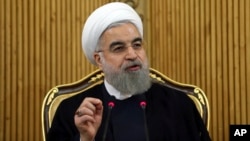Iran is on the brink of reintroducing itself to the world economy as economic sanctions may be lifted soon in accordance with the nuclear deal struck in Vienna last year. Iran agreed to curb its nuclear program in exchange for sanctions relief.
But last week, Saudi Arabia severed diplomatic ties with Iran after an attack on its embassy, following the execution of a prominent Shi’ite cleric.
Sunni-dominated Saudi Arabia and Shi’ite Iran are long-time rivals, believed to be fighting proxy wars in several countries. Analysts say Saudi officials object to Iran’s nuclear deal, as it brings its rival, Iran, closer to its allies in the West.
Following the diplomatic split between Saudi Arabia and Iran the agreement will be harder to implement, according to Mark Fitzpatrick, the executive director of the International Institute for Strategic Studies in the United States.
“There’s more ammunition for attacks on the nuclear deal,” he said. “I don’t think that the nuclear deal is going to fall apart because of this, but it’s already a fragile agreement, and more and more pressure will add to the troubles in implementing it.”
The continuing diplomatic crisis is also stymieing other reformist efforts to normalize Iran’s relationship with the international community, according to Ali Vaez, the International Crisis Group's senior analyst for Iran.
“This has been very detrimental for Iran’s image,” he says “and for President Rouhani’s efforts in basically turning the page in Iran’s pariah status.”
Iranian President Hassan Rouhani is often referred to as a reformist working towards ending years of political and economic isolation in Iran. The nuclear deal, a centerpiece of these reforms, is expected to catapult Iran back into the global economy.
“Proceeding Well”
Despite the pressure, officials say economic sanctions against Iran are expected to be lifted as Iran completes key elements of the deal, which includes dismantling equipment that could be used to develop a nuclear weapon.
“My expectations are that this day could come rather soon and that the implementation of the agreements is proceeding well,” said EU foreign policy chief Federica Mogherini on Monday. “It’s encouraging.”
News media in Iran report officials expect to decommission Iran’s Arak heavy water reactor within days, after previous reports the reactor’s core had already been filled with cement.
Signs of Change
The embassy attack and the continued diplomatic rift conjures the image of years past, when other embassies, including of the United States and Saudi Arabia were attacked in Iran, says Vaez of the Crisis Group.
“Now all of a sudden, Iran is seen once again as a country that attacks foreign embassies,” he explains. “And mobs that run in the streets of Tehran and chant ‘death’ to a specific country.”
However, unlike past embassy attacks in Iran, he says, Iranian authorities have uniformly condemned the attackers, and a regional security chief was fired after the incident.
Iran has also made diplomatic moves to repair the relationship, sending a letter to the U.N. Security Council shortly after the assault, expressing “regret” and vowing to prosecute offenders.
But the apology fell short, according to Vaez, because Iran apologized to the international community in general, not specifically to Saudi Arabia.
“I think the Iranians now realize that they fell into a trap,” he said. “They were looking forward [to] this week, when sanctions are lifted and the implementation day of the nuclear deal arrives, for Iran to be able to come in from the cold and normalize its relations to the outside world.”






